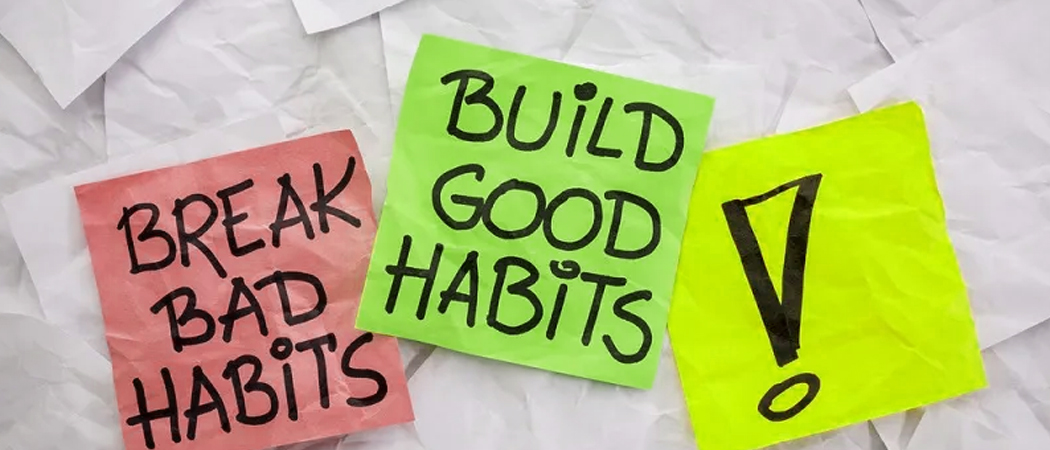Struggling to Make Good Habits Stick? You’re Not Alone.
If you’ve ever tried to break a bad habit or start a new healthy one, only to fall off track a few days later — you’re in good company.
Like most people, you’ve probably relied on motivation or willpower to power through. And while those bursts of determination might get you started, they’re rarely enough to make a habit last.
So, what’s the secret? Effective habit formation isn’t about trying harder — it’s about working smarter. It comes down to designing repeatable, realistic strategies that align with your personal values and strengths.
In this article, we’ll explore proven habit formation strategies from leading experts like B.J. Fogg and James Clear, and show you how to build habits that actually stick — without burning out.
Meet B.J. Fogg: The Scientist Behind the Tiny Habits Revolution
When it comes to sustainable behaviour change, B.J. Fogg is a name worth knowing. A behavioural scientist from Stanford University, Fogg is the founder of the Behaviour Design Lab and author of Tiny Habits: The Small Changes That Change Everything. His philosophy is refreshingly simple: you don’t need giant leaps to make lasting change – you need tiny, consistent actions.
Fogg’s method focuses on creating habits that take less than 30 seconds to complete. Why? Because tiny is fast, safe, and doesn’t rely on motivation or willpower to succeed. Instead of trying to overhaul your life overnight, Fogg recommends designing behaviour change using his Anatomy of a Tiny Habit: 1) an Anchor Moment (a routine you already do, like brushing your teeth), 2) a New Tiny Behaviour (like doing two push-ups), and 3) an Instant Celebration (a fist pump or a smile—anything that generates a positive emotional reward).
According to Fogg’s model – B = MAP—a behaviour only occurs when Motivation, Ability, and a Prompt come together at the same time. Rather than obsessing over motivation, he urges us to focus on removing barriers and setting ourselves up for “success momentum” – the idea that progress comes from the frequency of small wins, not their size. Just like plants, habits grow and multiply when nurtured with care, consistency, and the right environment.
How One Leader Beat Burnout—30 Seconds at a Time
Meet Sarah, a driven operations manager at a mid-sized tech company. Like many leaders, her days were jam-packed with meetings, decision-making, and putting out fires. She prided herself on her stamina—until it started to catch up with her.
Afternoons became a blur. She noticed she was snappier with her team, her decision-making slowed down, and by 3:00 PM, she was running on fumes. She knew she needed to take better care of herself, but carving out time for proper breaks felt impossible.
Then, she discovered B.J. Fogg’s Tiny Habits framework.
Instead of trying to force 30-minute breaks into her calendar (which never happened), she started small—really small. Inspired by Fogg’s concept of anchoring a new behaviour to an existing routine, she created this habit:
“After I close a meeting tab, I will stand up and take three deep breaths.”
That was it. No pressure to go for a walk. No mandatory screen break. Just three deep breaths. She celebrated each time with a little mental “Yes!” and even added a sticky note to her monitor as a prompt.
Within a week, that tiny habit grew. The three deep breaths turned into a quick stretch. A few days later, she started stepping outside for two minutes of fresh air. Eventually, she added a 10-minute afternoon walk to her schedule – without needing reminders.
Her energy improved, her team noticed the difference, and Sarah realised she wasn’t just taking a break – she was building a sustainable self-care habit grounded in behavioural science for herself. Over time her whole team started joining her, which organically created a culture of collective care.
As Sarah puts it:
“I stopped waiting for motivation. I started acting small—and it changed everything.”
Meet James Clear: The Master of Atomic Habits
When it comes to habit formation and behaviour change, James Clear is a name that has become synonymous with simplicity and effectiveness.
Best known for his bestselling book Atomic Habits: An Easy & Proven Way to Build Good Habits & Break Bad Ones, Clear takes a scientific approach to understanding how small, incremental changes can lead to massive transformations over time.
His philosophy centres on the idea that real, lasting change doesn’t come from drastic actions, but from building systems that foster continuous improvement. Clear’s core concept is the 4 Laws of Behaviour Change—Make it Obvious, Make it Attractive, Make it Easy, and Make it Satisfying. By applying these principles, Clear shows how tiny changes, when compounded consistently, lead to exponential results.
Clear also emphasizes the power of identity-based habits, where the key to lasting change is in becoming the person you want to be, not just achieving a specific goal. By designing your environment and focusing on small wins, you can rewire your habits to align with your deeper values and aspirations, making success an inevitable outcome.
From Scattered to Systematic: How a Business Leader Used Atomic Habits to Regain Focus
Tom, a regional sales director for a growing retail chain, had a classic problem: he wanted to be more focused and proactive – but his day kept getting hijacked by emails, urgent calls, and fire-fighting. He was constantly reacting instead of leading strategically. At the end of each day, he’d feel drained and wonder where the time had gone.
That’s when we shared a concept from James Clear’s Atomic Habits in a training session that Tom attended. One idea hit him hard: “You do not rise to the level of your goals. You fall to the level of your systems.”
Tom realised his system for managing his workday didn’t support the kind of leader he wanted to be.
He decided to build a habit of focused, uninterrupted strategy time – something he shared that was important to him, but he never actually made happen.
Following Clear’s principles, he made two key changes:
Habit stacking: He stacked his new habit onto an existing one. He said:
“After I make my morning coffee, I’ll open my ‘Strategy Sprint’ doc and work for 15 minutes.”Environment design: He cleared distractions by turning off email notifications and leaving his phone in another room. He also created a dedicated focus playlist and a shortcut to the doc on his desktop.
The biggest shift? Tom started to see himself as someone who prioritises deep thinking. This aligns with Clear’s emphasis on identity-based habits—where the goal isn’t just to do the habit, but to become the type of person who does it.
Over time, those 15 minutes stretched to 30, then to an hour a few times a week. Within a month, Tom was regularly crafting better strategies, anticipating challenges before they became crises, and feeling more in control of his day.
His team noticed the change too.
As Tom shared during another leadership workshop we facilitated:
“It wasn’t about finding more time – it was about using what I had with more intention. Tiny wins stacked up into big impact.”
Create Lasting Change with Masterful Habit Formation
The beauty of mastering habit formation lies in its simplicity. You don’t need to reinvent the wheel or make drastic changes overnight. Small, consistent actions can lead to monumental shifts in your life. By embracing proven strategies from habit experts like B.J. Fogg and James Clear, you can design habits that align with your values and stick for the long haul.
Whether you’re aiming to break bad habits or cultivate new, healthier ones, the key is in starting small and celebrating each success along the way.
The result? A smoother, more manageable path to achieving your goals, improved productivity, and enhanced wellbeing. Your habits don’t just define your day; they shape your life. And with the right approach, you can make every day count.
Transform Your Life with Expert Coaching
Mastering habit formation isn’t just about willpower – it’s about setting yourself up for success by creating the right environment and systems for change. At Get Mentally Fit, we’ve helped countless professionals unlock their potential by applying evidence-based habit strategies to both personal and professional growth.
With personalised coaching from our Principal Psychologist Emily Johnson, you’ll learn how to implement small, sustainable changes that lead to big results – whether it’s improving performance, reducing stress, or creating lasting positive habits.
🚀 Ready to turn small habits into big wins? Let’s talk about how coaching can help you build a future of success and fulfilment. Get in touch!


